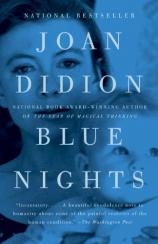Blue Nights
Review
Blue Nights
On August 26, 2005, Joan Didion’s 39-year-old daughter, Quintana Roo, died in New York Cornell Hospital after a long siege of illness that began with the flu and ended with her death from septic shock, barely 20 months after the sudden passing of Didion’s husband, John Dunne. In THE YEAR OF MAGICAL THINKING, Quintana’s struggle formed the backdrop for Didion’s account of her life with Dunne and her effort to cope with the enormity of his death. Now, from the same store of still raw memories, this time with her daughter at center stage, Didion has fashioned an equally compelling meditation on parental love, loss, memory and the perils of old age.
"[a] compelling meditation on parental love, loss, memory and the perils of old age."
Didion begins on the day of Quintana’s wedding in July 2003, at the Cathedral of St. John the Divine in New York City, a time when Didion “still counted happiness and health and love and luck and beautiful children as ‘ordinary blessings.’” Two years later, Quintana’s ashes were interred in that same cathedral, and like an endlessly running tape loop, Didion’s narrative circles backward and forward through time, almost defying any attempt to construct a coherent chronology. Perhaps that’s a reflection of the fragmentary pieces of memory she’s trying to reassemble, and a concession to the challenge of stitching together the multiple threads of this short, but complex, book.
At the heart of BLUE NIGHTS is Didion’s exploration of the blessings and burdens of parenthood. She describes the quick, almost casual way she and Dunne were able to adopt Quintana immediately after her birth in 1966. She then dwells, amid stories of her daughter’s sometimes troubled childhood (more privileged than many, but hardly extraordinary) on the contingencies that might have prevented that adoption from ever taking place. In her early 30s, Quintana’s siblings and birth mother make an appearance, but the reunion --- warm and friendly at first --- is a mixed blessing, and ultimately confirms Didion’s feelings about the “muddled impulses that can go hand in hand with adoption.”
Describing herself as the beneficiary of a kind of “benign neglect” in childhood, Didion contrasts that with the way we “now measure success as the extent to which we manage to keep our children monitored, tethered, tied to us.” And yet, for all that, Didion understands there is no magic at her command to ward off sudden death or the ravages of disease. “When we talk about mortality, she writes, “we are talking about our children.”
That same sense of futility emerges again when Didion despairs of our effort to hold on to tangible objects, like talismans, to help us recall our loved ones. Sorting through a box of mementos, she muses:
“In theory these mementos serve to bring back the moment.
“In fact they serve only to make clear how inadequately I appreciated the moment when it was here.”
“How inadequately I appreciated the moment when it was here is something else I could never afford to see.”
But she is perhaps most effective in describing her own attempt to grapple with the countless deprivations of aging, made even harsher in her case by the loss of the two people she held most dear. Now 77, she traces with clinical detachment the markers of her own physical decline --- the night she passed out in her apartment and awoke dazed and bleeding; the painful onset of shingles in 2007 that continues to leave its mark; and an unexplained disorder, “this neuritis, this neuropathy, this neurological inflammation.” Most of all, she tries to sort out the fear and frailty that plague her in the wake of these losses. “Aging and its evidence remain life’s unpredictable events, yet they remain matters we prefer to leave unmentioned, unexplored,” she concludes. Even from a writer as cool and detached as Didion, it’s hard to imagine the steely determination it took to stare down so many unpleasant truths so directly.
Didion is no less candid in expressing her fear about never being able to write again: “What if I can never again locate the words that work?” She’s obsessed with maintaining her “momentum,” reflecting on the wisdom of Quintana’s determination to get over the death of an acquaintance by deciding simply “not to dwell on it.”
But on the evidence displayed in these haunting pages, it seems she has no reason to fear that her powers as a writer are diminished. All the hallmarks of her inimitable prose style are here: spare, precise diction, incantatory repetition, elliptical passages and persistent questions. These devices are employed to powerful effect as we accompany her from the land of mourning into a brighter past and then back again to darkness and confusion.
"What greater grief can there be for mortals than to see their children dead?” asked Euripides, his stark and terrible question echoing down through the centuries to be invoked by Joan Didion. In this eloquent, sorrowful memoir, she bears witness to that most unspeakable of losses.
Reviewed by Harvey Freedenberg on November 3, 2011
Blue Nights
- Publication Date: May 29, 2012
- Genres: Nonfiction
- Paperback: 208 pages
- Publisher: Vintage
- ISBN-10: 0307387380
- ISBN-13: 9780307387387











